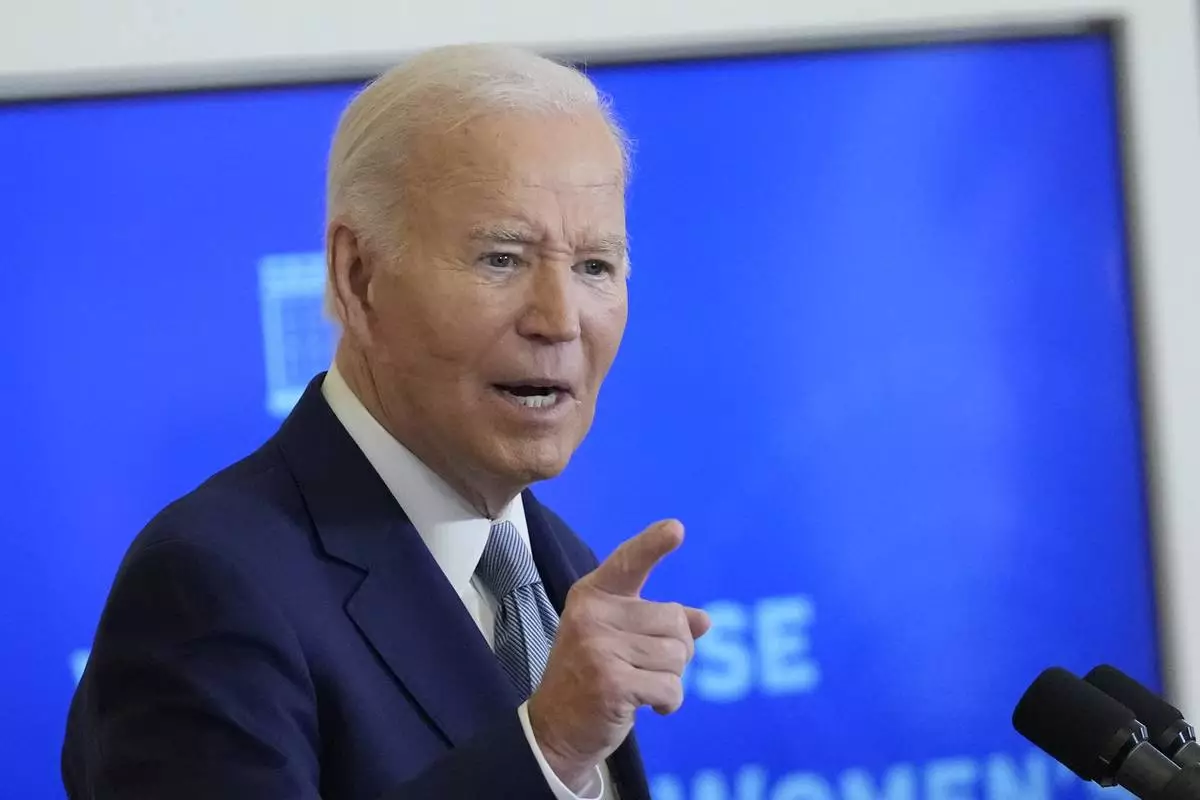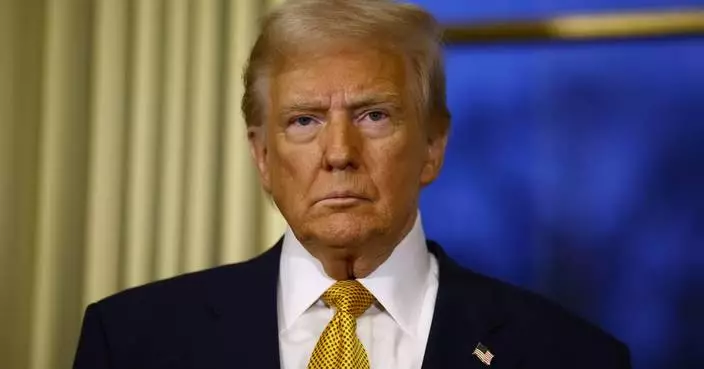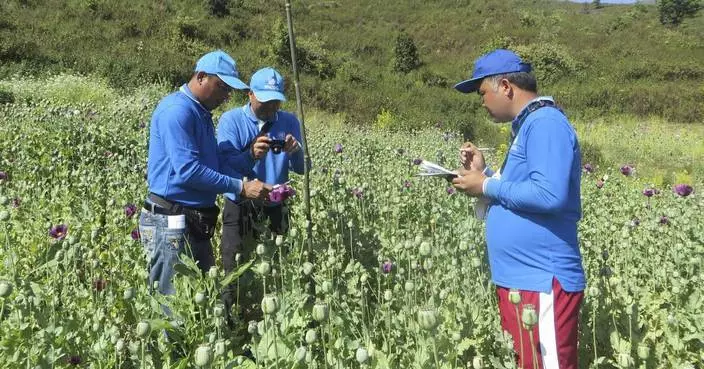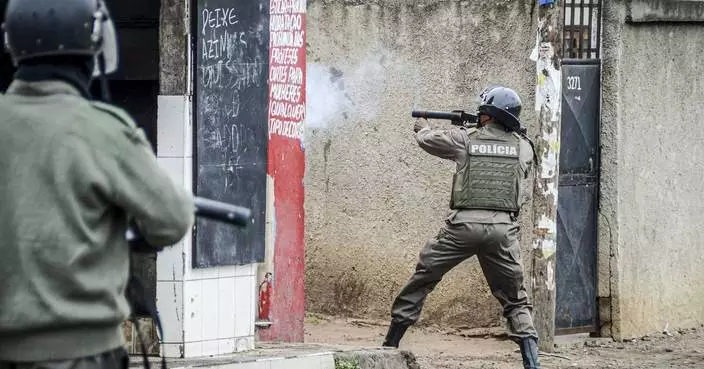TOKYO (AP) — Meat from fin whales caught for the first time in nearly 50 years off Japan’s northern coast fetched up to more than $1,300 per kilogram (2.2 lbs) at auction Thursday, as officials try to keep the struggling industry alive.
Japan’s Fisheries Agency this year added fin whales to its list of three whale species that can be legally hunted as the country expands commercial whaling along its coast.
Japan resumed commercial whaling within its exclusive economic zone after withdrawing from the International Whaling Commission in 2019. The IWC designated the fin whale as a species for protection from overhunting in 1976.
Japan said its recent stock surveys confirmed a sufficient recovery of fin whale populations in the North Pacific. Officials said 30 of the whales — half of the quota of 60 — were caught this season. Japan set a combined catch quota of 379 for the three other whale species — minke, Bryde's and sei whales.
The country's only large-scale whaling fleet operator Kyodo Senpaku Co. launched the 7.5 billion-yen ($49-million) Kangei Maru — a 9,300-ton new ship — this year in a show of determination to stay in the industry.
On Thursday, some 1.4 tons of fresh meat from several fin whales caught off Japan’s northern main island of Hokkaido was auctioned at the Sapporo fish market and the Kangei Maru’s home port of Shimonoseki.
In Shimonoseki, where 250 kilograms (550 lbs) of fin whale meat was flown from Hokkaido for the event, the tail meat — a delicacy known as “onomi” — fetched the day’s highest price at 200,000 yen ($1,312) per kilogram (2.2 lbs), according to the city’s fishery promotion department.
“We hear the larger the whale, the better the taste, so I assume fin whales are more delicious than other kinds of whales, though I never had a chance to taste it and cannot compare,” city official Ryo Minezoe said.
Japan’s whaling has long been a source of controversy and criticism from conservationists.
But anti-whaling protests have largely subsided after Japan switched from much-criticized Antarctic “research whaling” — seen as a cover for commercial hunts — to commercial whaling off the country's waters.
Last year, Japanese whalers caught 294 minke, Bryde’s and sei whales — less than 80% of the quota and fewer than the number once hunted in the Antarctic and the northwestern Pacific under the research program.
Whaling officials link the declining catch to climate change, but critics say overhunting may be the cause.
Nanami Kurasawa, who heads a conservationist group Dolphin & Whale Action Network, opposes resuming hunts of fin whales, saying they had gone nearly extinct after overhunt decades ago and their details around the Japanese coasts are not fully researched. Whalers want to go after larger whales because of efficiency, but they should more thoroughly investigate whale stock, she says.
Whale meat in Japan was an affordable source of protein for the country's malnourished population in the years following World War II, with annual consumption peaking at 233,000 tons in 1962. Other meats have largedly replaced whale and supply has since fallen to around 2,000 tons in recent years, Fisheries Agency statistics show.
Japanese officials want to increase that to about 5,000 tons, to keep the industry afloat.
Experts say they doubt there is much demand in Japan where whale meat is no longer a familiar, affordable food. The biggest question is if the industry can survive without government subsidies of hundreds of millions of yen (millions of dollars).
Nobuhiro Kishigami, a professor and expert on indigenous whaling at National Museum of Ethnology in Osaka, said whale meat is eaten in some whaling towns but rarely in Tokyo or elsewhere in Japan. Whale meat is more expensive than beef or other meat.
“It is not a kind of food you have daily, but a delicacy ... If it is not accessible and delicious, well, let’s leave the taste aside, it won’t sell if it is not cheap and good,” he said. “This is supposed to be business, and without large government subsidies, I think it would be extremely difficult for it to be sustainable.”

This photo released by Shimonoseki City, Agriculture, Forestry and Fisheries Maintenance Division shows an auction selling fresh meat of fin whales at a fish market in Shimonoseki, Yamaguchi prefecture, southern Japan Thursday, Dec. 12, 2024. (Shimonoseki City, Agriculture, Forestry and Fisheries Maintenance Division via AP)

This photo released by Shimonoseki City, Agriculture, Forestry and Fisheries Maintenance Division shows fresh meat of fin whales displayed on tray at a fish market in Shimonoseki, Yamaguchi prefecture, southern Japan Thursday, Dec. 12, 2024. (Shimonoseki City, Agriculture, Forestry and Fisheries Maintenance Division via AP)

This photo released by Shimonoseki City, Agriculture, Forestry and Fisheries Maintenance Division shows an auction selling fresh meat of fin whales at a fish market in Shimonoseki, Yamaguchi prefecture, southern Japan Thursday, Dec. 12, 2024. (Shimonoseki City, Agriculture, Forestry and Fisheries Maintenance Division via AP)
WASHINGTON (AP) — President Joe Biden is commuting the sentences of roughly 1,500 people who were released from prison and placed on home confinement during the coronavirus pandemic and is pardoning 39 Americans convicted of nonviolent crimes. It's the largest single-day act of clemency in modern history.
The commutations announced Thursday are for people who have served out home confinement sentences for at least one year after they were released. Prisons were uniquely bad for spreading the virus and some inmates were released in part to stop the spread. At one point, 1 in 5 prisoners had COVID-19, according to a tally kept by The Associated Press.
Biden said he would be taking more steps in the weeks ahead and would continue to review clemency petitions. The second largest single-day act of clemency was by Barack Obama, with 330, shortly before leaving office in 2017.
“America was built on the promise of possibility and second chances,” Biden said in a statement. “As president, I have the great privilege of extending mercy to people who have demonstrated remorse and rehabilitation, restoring opportunity for Americans to participate in daily life and contribute to their communities, and taking steps to remove sentencing disparities for non-violent offenders, especially those convicted of drug offenses.”
The clemency follows a broad pardon for his son Hunter, who was prosecuted for gun and tax crimes. Biden is under pressure from advocacy groups to pardon broad swaths of people, including those on federal death row, before the Trump administration takes over in January. He’s also weighing whether to issue preemptive pardons to those who investigated Trump’s effort to overturn the results of the 2020 presidential election and are facing possible retribution when he takes office.
Clemency is the term for the power the president has to pardon, in which a person is relieved of guilt and punishment, or to commute a sentence, which reduces or eliminates the punishment but doesn’t exonerate the wrongdoing. It’s customary for a president to grant mercy at the end of his term, using the power of the office to wipe away records or end prison terms.
Those pardoned Thursday had been convicted of nonviolent crimes such as drug offenses and turned their lives around, White House lawyers said. They include a woman who led emergency response teams during natural disasters; a church deacon who has worked as an addiction counselor and youth counselor; a doctoral student in molecular biosciences; and a decorated military veteran.
The president had previously issued 122 commutations and 21 other pardons. He's also broadly pardoned those convicted of use and simple possession of marijuana on federal lands and in the District of Columbia, and pardoned former U.S. service members convicted of violating a now-repealed military ban on consensual gay sex.
Rep. Jim McGovern, D-Mass., and 34 other lawmakers are urging the president to pardon environmental and human rights lawyer Steven Donziger, who was imprisoned or under house arrest for three years because of a contempt of court charge related to his work representing Indigenous farmers in a lawsuit against Chevron.
Others are advocating for Biden to commute the sentences of federal death row prisoners. His attorney general, Merrick Garland, paused federal executions. Biden had said on the campaign trail in 2020 that he wanted to end the death penalty but he never did, and now, with Trump coming back into office, it’s likely executions will resume. During his first term, Trump presided over an unprecedented number of federal executions, carried out during the height of the pandemic.
More pardons are coming before Biden leaves office on Jan. 20, but it's not clear whether he'll take action to guard against possible prosecution by Trump, an untested use of the power. The president has been taking the idea seriously and has been thinking about it for as much as six months — before the presidential election — but has been concerned about the precedent it would set, according to people familiar with the matter who spoke to The Associated Press on condition of anonymity to discuss internal discussions.
But those who received the pardons would have to accept them. New California Sen. Adam Schiff, who was the chairman of the congressional committee that investigated the violent Jan. 6 insurrection, said such a pardon from Biden would be “unnecessary,” and that the president shouldn’t be spending his waning days in office worrying about this.
Before pardoning his son, Biden had repeatedly pledged not to do so. He said in a statement explaining his reversal that the prosecution had been poisoned by politics. The decision prompted criminal justice advocates and lawmakers to put additional public pressure on the administration to use that same power for everyday Americans. It wasn’t a very popular move; only about 2 in 10 Americans approved of his decision, according to a poll from The Associated Press-NORC Center for Public Affairs Research.

President Joe Biden speaks at the White House Conference on Women's Health Research from the East Room of the White House in Washington, Wednesday, Dec. 11, 2024. (AP Photo/Susan Walsh)













